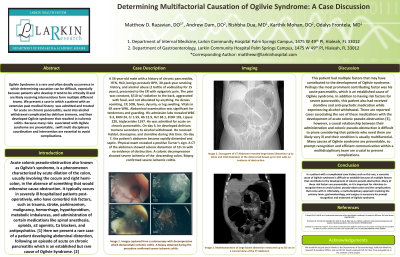Tuesday Poster Session
Category: Colon
P3067 - Determining Multifactorial Causation of Ogilvie Syndrome: A Case Discussion
Tuesday, October 24, 2023
10:30 AM - 4:00 PM PT
Location: Exhibit Hall

Has Audio

Matthew D. Razavian, DO
Larkin Community Hospital, Palm Springs Campus
Hialeah, FL
Presenting Author(s)
Matthew Razavian, DO, Andrew Dam, DO, Rishbha Dua, MD, Karthik Mohan, DO
Larkin Community Hospital, Palm Springs Campus, Hialeah, FL
Introduction: Acute colonic pseudo-obstruction, also known as Ogilvie’s syndrome, is a phenomenon characterized by acute dilation of the colon in the absence of something that would otherwise cause obstruction. It typically occurs in severely ill hospitalized patients who have comorbid risk factors such as trauma, stroke, parkinsonism, malignancy, hemorrhage, hypothyroidism, metabolic imbalances, and administration of certain medications like opioids, a2 agonists, and antipsychotics.
Case Description/Methods: A 56-year-old male with a history of chronic pancreatitis, HTN, HLD, benign prostatic BPH, 30-pack-year smoking history, and alcohol abuse (1 bottle of vodka/day for 15 years), presented to the ER with epigastric pain. He described the pain as constant, 8/10 w/ radiation to the back, aggravated with food, and not alleviated by anything. He denies vomiting, CP, SOB, fever, dysuria, or leg swelling. Vitals in ER were WNL. Abdominal examination was significant for tenderness and guarding. His admission labs revealed WBC 9.3, BUN 24, Cr 1.59, Hb 12.9, Hct 38.1, EtOH 101, Lipase 220, triglycerides 1197. He was admitted for acute on chronic pancreatitis. On day 3, he developed delirium tremens secondary to alcohol withdrawal. He received haldol, olanzapine, and clonidine during this time. On day 7, the patient’s abdomen became rapidly distended and septic. Physical exam revealed a positive Turner’s sign. A CT of the abdomen showed colonic distention of 10 cm with no evidence of obstruction. A colonic decompression showed severe ischemia of the descending colon. Biopsy confirmed severe ischemic colitis.
Discussion: This patient had multiple factors that may have contributed to the development of Ogilvie syndrome. Perhaps the most prominent contributing factor was his acute pancreatitis, which is an established cause of Ogilvie syndrome. In addition to having risk factors for severe pancreatitis, this patient also had received clonidine and anti-psychotic medication while experiencing alcohol withdrawal. There are reported cases associating the use of these medications with the development of acute colonic pseudo-obstruction, however, a causal relationship between their administration and colonic pseudo-obstruction is difficult to prove considering that patients who need them are likely very ill and their condition is usually multifactorial. Many causes of Ogilvie syndrome are preventable, so prompt recognition and efficient communication within a multidisciplinary team are crucial to prevent complications.

Disclosures:
Matthew Razavian, DO, Andrew Dam, DO, Rishbha Dua, MD, Karthik Mohan, DO. P3067 - Determining Multifactorial Causation of Ogilvie Syndrome: A Case Discussion, ACG 2023 Annual Scientific Meeting Abstracts. Vancouver, BC, Canada: American College of Gastroenterology.
Larkin Community Hospital, Palm Springs Campus, Hialeah, FL
Introduction: Acute colonic pseudo-obstruction, also known as Ogilvie’s syndrome, is a phenomenon characterized by acute dilation of the colon in the absence of something that would otherwise cause obstruction. It typically occurs in severely ill hospitalized patients who have comorbid risk factors such as trauma, stroke, parkinsonism, malignancy, hemorrhage, hypothyroidism, metabolic imbalances, and administration of certain medications like opioids, a2 agonists, and antipsychotics.
Case Description/Methods: A 56-year-old male with a history of chronic pancreatitis, HTN, HLD, benign prostatic BPH, 30-pack-year smoking history, and alcohol abuse (1 bottle of vodka/day for 15 years), presented to the ER with epigastric pain. He described the pain as constant, 8/10 w/ radiation to the back, aggravated with food, and not alleviated by anything. He denies vomiting, CP, SOB, fever, dysuria, or leg swelling. Vitals in ER were WNL. Abdominal examination was significant for tenderness and guarding. His admission labs revealed WBC 9.3, BUN 24, Cr 1.59, Hb 12.9, Hct 38.1, EtOH 101, Lipase 220, triglycerides 1197. He was admitted for acute on chronic pancreatitis. On day 3, he developed delirium tremens secondary to alcohol withdrawal. He received haldol, olanzapine, and clonidine during this time. On day 7, the patient’s abdomen became rapidly distended and septic. Physical exam revealed a positive Turner’s sign. A CT of the abdomen showed colonic distention of 10 cm with no evidence of obstruction. A colonic decompression showed severe ischemia of the descending colon. Biopsy confirmed severe ischemic colitis.
Discussion: This patient had multiple factors that may have contributed to the development of Ogilvie syndrome. Perhaps the most prominent contributing factor was his acute pancreatitis, which is an established cause of Ogilvie syndrome. In addition to having risk factors for severe pancreatitis, this patient also had received clonidine and anti-psychotic medication while experiencing alcohol withdrawal. There are reported cases associating the use of these medications with the development of acute colonic pseudo-obstruction, however, a causal relationship between their administration and colonic pseudo-obstruction is difficult to prove considering that patients who need them are likely very ill and their condition is usually multifactorial. Many causes of Ogilvie syndrome are preventable, so prompt recognition and efficient communication within a multidisciplinary team are crucial to prevent complications.

Figure: CT of the patient's abdomen revealed large bowel distention up to 10cm and mild distention of the distal small bowel up to 3cm with no evidence of obstruction
Disclosures:
Matthew Razavian indicated no relevant financial relationships.
Andrew Dam indicated no relevant financial relationships.
Rishbha Dua indicated no relevant financial relationships.
Karthik Mohan indicated no relevant financial relationships.
Matthew Razavian, DO, Andrew Dam, DO, Rishbha Dua, MD, Karthik Mohan, DO. P3067 - Determining Multifactorial Causation of Ogilvie Syndrome: A Case Discussion, ACG 2023 Annual Scientific Meeting Abstracts. Vancouver, BC, Canada: American College of Gastroenterology.
